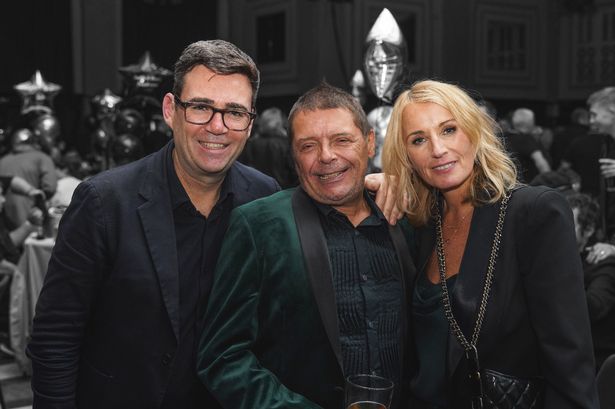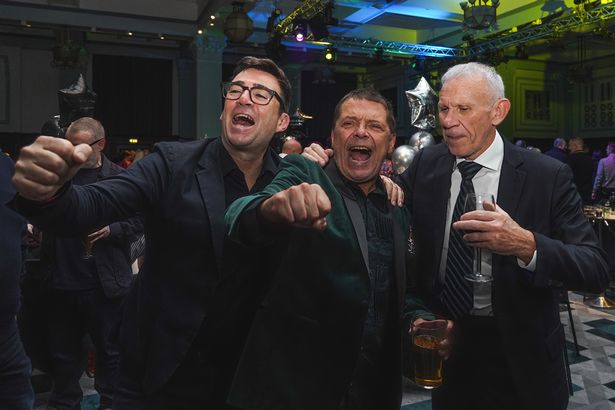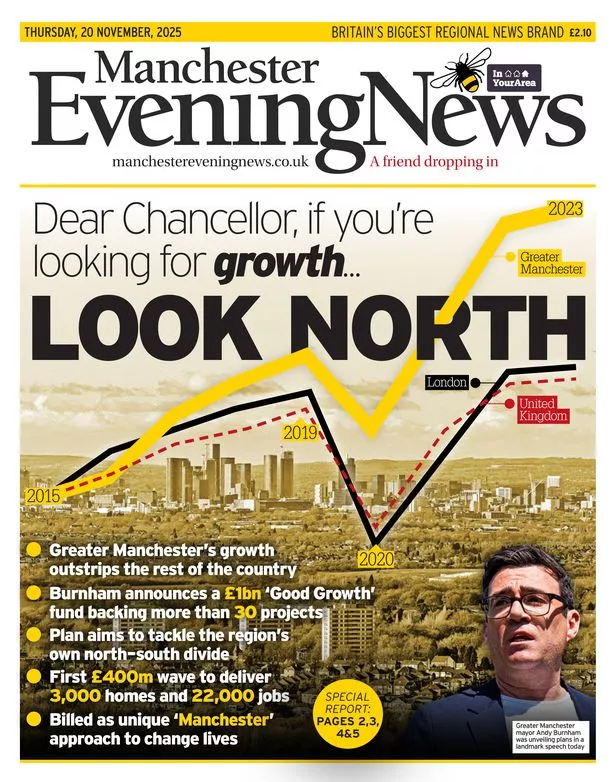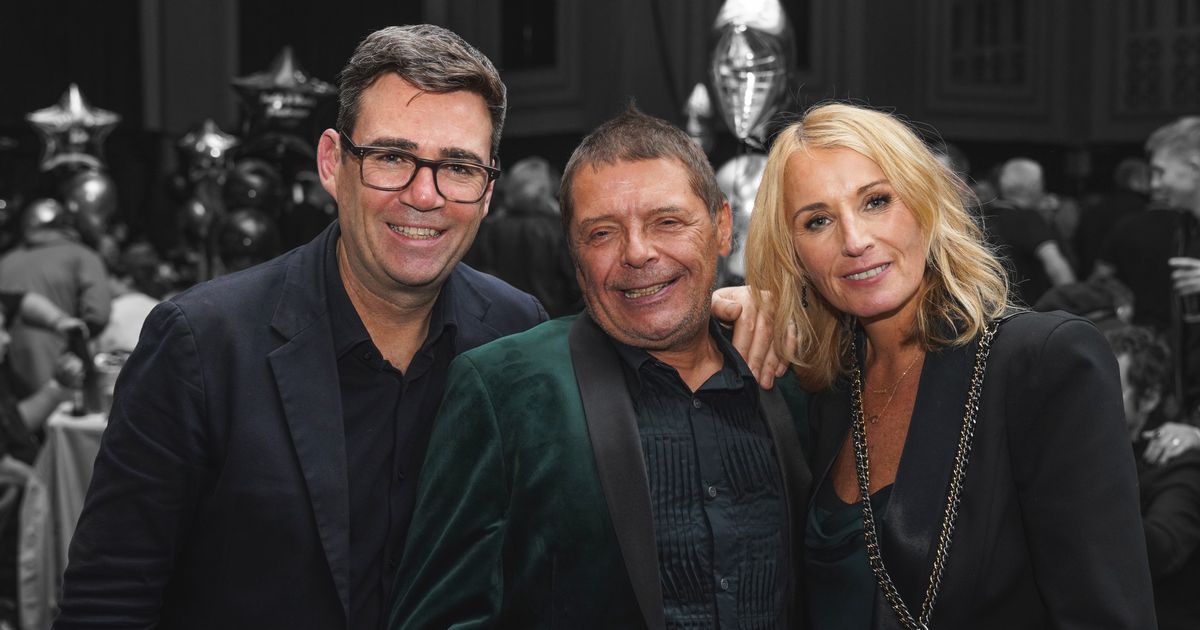Days after the death of Manc legend Gary ‘Mani’ Mounfield, mayor Andy Burnham reflects on the role the Stone Roses played in the city’s transformation – and how the region can grow following the announcement of his £1bn growth plan.
Andy Burnham, mayor of Greater Manchester
17:06, 23 Nov 2025Updated 17:33, 23 Nov 2025
 Andy Burnham with Mani and his wife Imelda at one of her charity fundraisers(Image: Paul Husband)
Andy Burnham with Mani and his wife Imelda at one of her charity fundraisers(Image: Paul Husband)
I am sure I can’t be the only one who has spent the weekend listening to the Stone Roses with a new intensity – particularly those basslines. It has taken me right back to the summer of 1989 and my first summer job in an office at the top of Portland Street.
I would spend every lunch-hour mooching around the old Piccadilly Records shop and then go over the road into the gardens to eat my lunch.
One day, a sign appeared in the ticket booth: “Stone Roses, Empress Ballroom, Blackpool, August 12”. I bought three tickets on the spot for me and my brothers.
A few weeks later, we went up the M6 with what seemed like the whole of Manchester for one of the best nights of our lives. That summer, I fell in love with Manchester.
When I graduated from university two years later, I came home determined to live in the city and find a job. But, after months of trying, I couldn’t find anything. I filled a role as an unpaid reporter on the Middleton Guardian but struggled to find the money for the bus fares, which had shot up whilst I had been away.
I came to the painful realisation that the energy of Manchester’s music scene, and our audacious bid to hold the Olympic Games, were filling a hole where the rest of its economy should have been.
 Gary ‘Mani’ Mounfield(Image: PA)
Gary ‘Mani’ Mounfield(Image: PA)
As I said in my speech this week launching our new £1bn GM Good Growth Fund, it wasn’t until the summer 1996 that the turnaround of Manchester began in earnest in the aftermath of the devastating IRA bomb.
And what a turnaround it has been. We are now the fastest-growing city-region in the UK by some distance and back in charge of our buses.
The simplest way of describing the huge shift that has happened in those 30 years is that now a young person growing up in one of our 10 boroughs doesn’t have to leave and go south to get on in life. That was the reality for all those of us born in the second half of the 20th century and it is a truly brilliant thing that it no longer applies.
In fact, it is because younger people can’t afford to live in London that many base themselves here and companies are coming north to find them. That is a significant factor in our ongoing success.
But, as much as that is to be celebrated, I would be the first to acknowledge that the growth we have seen in the last decade has not been felt everywhere.
Too many of our towns are struggling and haven’t felt the change. This is where the new Good Growth Fund comes in. We have learnt over the last 10 years that we won’t start the turnaround in a place unless we are prepared to intervene where the market won’t.
This is what happened in Manchester city centre after the great Sir Howard Bernstein persuaded George Osborne to create a public investment fund to kick-start projects which he knew to be viable.
 Andy Burnham with Mani and Peter Reid at one of Imelda’s charity events(Image: Paul Husband)
Andy Burnham with Mani and Peter Reid at one of Imelda’s charity events(Image: Paul Husband)
His argument was that London-based lenders had a downer on Manchester and wouldn’t back schemes here even though they could be profitable. How right he has been proved to be.
Over the last 10 years, my team at the GMCA (Greater Manchester Combined Authority) has awarded loans worth £1bn. There has not been one single default on a loan and the proceeds have been recycled back into improving housing more broadly, for instance by the creation of the GM Good Landlord Charter.
This is what we mean by good growth. Rather than seeing the profits of development syphoned out of Greater Manchester, we want to see more of the proceeds coming back in to create good jobs and good homes for people.
A few years ago, I faced the same challenge as Howard in Stockport. I was told that the market wouldn’t lend to support the building of the new housing development that was planned as part of the new interchange.
So here was our dilemma. Were we going to have to let the whole scheme stall or were we prepared to back it ourselves? In other words, were we going to let the market decide the future of Stockport or were we prepared to do it ourselves?
 The front page of Thursday’s edition of the Manchester Evening News(Image: M.E.N.)
The front page of Thursday’s edition of the Manchester Evening News(Image: M.E.N.)
Of course, we chose the latter course and we proved the market wrong. The development is already fully let and Stockport is thriving.
This is the new confidence that we carry into the second decade of devolution in Greater Manchester. We see much more potential in our people and places than the markets ever will and we will be backing them all through our new Good Growth Fund.
So, this week, I’ve had a strong sense of life coming full circle. I’ll even admit to feeling quite emotional at the amazing launch of the public engagement on the new Middleton Mayoral Development Corporation – my gift back to the place and its wonderful people which launched me on my way back in 1991.
And I think I shed a tear or two as I was listening to the Stone Roses on my morning run on Friday. I got the terrible news about Mani just as I had finished my speech on Thursday.
I had praised Sir Howard, rightly, for his role in our incredible journey. But this is the weekend to recognise the role of Mani together with Ian, John, Reni and all those giants of the 80s in our transformation.
They lifted the place up when it was on the floor and gave us hope when we had none. They started it all.
Gary ‘Mani’ Mounfield, rest in peace. Manchester salutes you and will love you forever.
